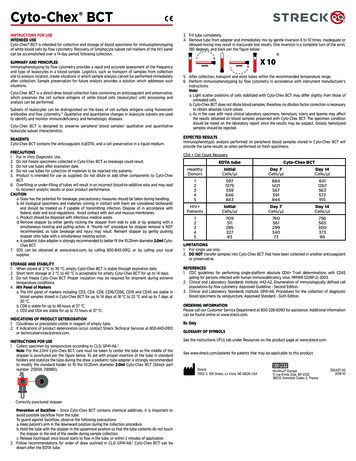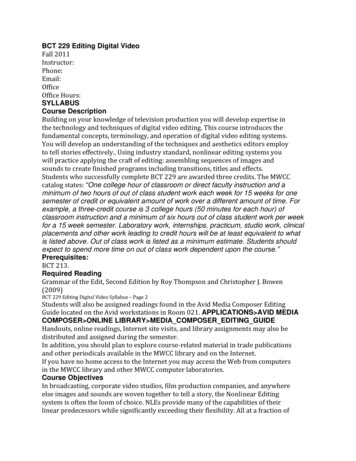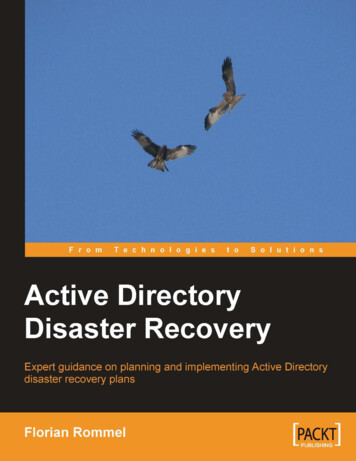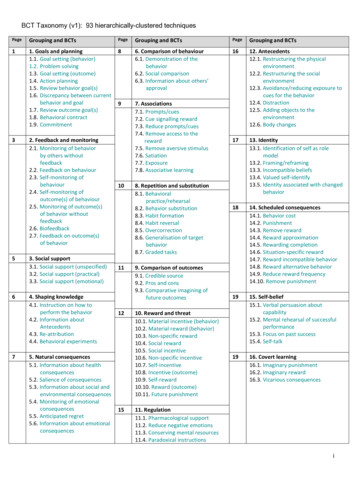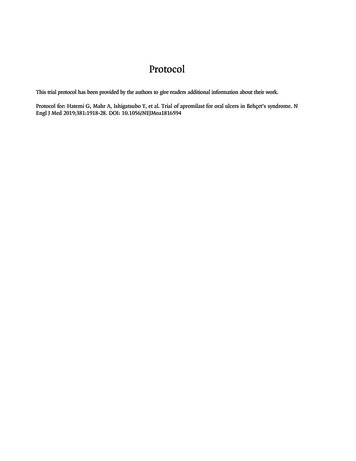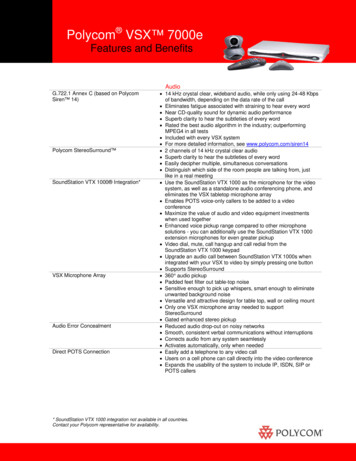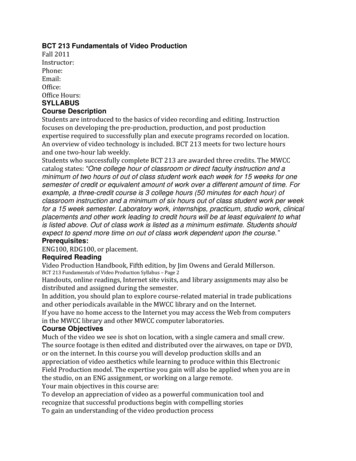
Transcription
BCT 213 Fundamentals of Video ProductionFall 2011Instructor:Phone:Email:Office:Office Hours:SYLLABUSCourse DescriptionStudents are introduced to the basics of video recording and editing. Instructionfocuses on developing the pre-production, production, and post productionexpertise required to successfully plan and execute programs recorded on location.An overview of video technology is included. BCT 213 meets for two lecture hoursand one two-hour lab weekly.Students who successfully complete BCT 213 are awarded three credits. The MWCCcatalog states: “One college hour of classroom or direct faculty instruction and aminimum of two hours of out of class student work each week for 15 weeks for onesemester of credit or equivalent amount of work over a different amount of time. Forexample, a three-credit course is 3 college hours (50 minutes for each hour) ofclassroom instruction and a minimum of six hours out of class student work per weekfor a 15 week semester. Laboratory work, internships, practicum, studio work, clinicalplacements and other work leading to credit hours will be at least equivalent to whatis listed above. Out of class work is listed as a minimum estimate. Students shouldexpect to spend more time on out of class work dependent upon the course.”Prerequisites:ENG100, RDG100, or placement.Required ReadingVideo Production Handbook, Fifth edition, by Jim Owens and Gerald Millerson.BCT 213 Fundamentals of Video Production Syllabus – Page 2Handouts, online readings, Internet site visits, and library assignments may also bedistributed and assigned during the semester.In addition, you should plan to explore course-related material in trade publicationsand other periodicals available in the MWCC library and on the Internet.If you have no home access to the Internet you may access the Web from computersin the MWCC library and other MWCC computer laboratories.Course ObjectivesMuch of the video we see is shot on location, with a single camera and small crew.The source footage is then edited and distributed over the airwaves, on tape or DVD,or on the internet. In this course you will develop production skills and anappreciation of video aesthetics while learning to produce within this ElectronicField Production model. The expertise you gain will also be applied when you are inthe studio, on an ENG assignment, or working on a large remote.Your main objectives in this course are:To develop an appreciation of video as a powerful communication tool andrecognize that successful productions begin with compelling storiesTo gain an understanding of the video production process
To identify key pieces of equipment and facilities used in video productionTo become familiar with the roles of production personnelTo learn basic video technologyTo learn and practice video camera operationTo become familiar with the basic techniques of video lightingTo gain an understanding of the mechanics and aesthetics of video editingTo gain an understanding of the role and responsibilities of the televisiondirectorTo employ a word processing computer application to generate a script in aconventional formatTo synthesize the knowledge and expertise you gain in this course tosuccessfully produce and direct a short professional-quality productionTeaching ProceduresClass meetings consist of lecture and discussion of the concepts and skills associatedwith video production. You will practice and display your understanding of thiscontent through class participation, successful completion of homeworkassignments, quizzes, and exams.BCT 213 Fundamentals of Video Production Syllabus – Page 3Labs consist of demonstrations, workshops, and exercises giving you theopportunity to develop and practice the fundamental skills used by productionprofessionals. You will demonstrate your mastery of these skills throughparticipation in the exercises and successful completion of production assignments.A schedule of lab activities will be distributed for your specific lab section.Plan to wear comfortable clothing and footwear to lab meetings. You will typicallybe engaged in hands-on production activities in the studio or on location.You are required to provide DVD’s or other media necessary to archive yourproduction work.During the semester you will have the opportunity to participate in additionalproduction activities outside of the course. I suggest you take advantage of theseoccasions to further develop your production expertise.Grading Policy60% of your final grade will be determined by lecture activities as follows:On-Line Quizzes 15%Assignments 15%Unit Assessments (Tests) 15%Final Exam 15%40% of your final grade will be determined by lab activities as follows:Production Assignments & Exercises 20%Student Production(s) 20%Students are expected to complete an on-line quiz for each chapter assigned fromthe text. Quizzes will be accessible for one week and must be completed prior to theclass meeting for which the chapter is assigned. I will distribute a separate schedulelisting all on-line quizzes and the dates of their availability.All written assignments must be created in a word processing computer applicationand are expected to meet the standard of college-level grammar usage, spelling, andsentence structure.
All BCT213 students are required to attend Professional Connections events as theyare scheduled during the semester. Each unexcused absence shall constitute onemissing assignment.IN FAIRNESS TO ALL STUDENTS IN THE CLASS, AND TO MOST ACCURATELY CONFORM TOPROFESSIONAL PRACTICES ALL DEADLINES MUST BE STRICTLY OBSERVED.BCT 213 Fundamentals of Video Production Syllabus – Page 4AttendanceMuch of what you will learn in this course will result from demonstration and handson experience. Therefore every absence and incidence of tardiness results in amissed opportunity for you to achieve your goals in this course.Due to the quantity of content we will cover and the logistics of schedulingequipment and facilities it will be difficult if not impossible to make up for the workmissed due to absence. If you don’t actively participate you won’t meet the courseobjectives and your final grade will reflect your lack of success.Attendance and punctuality is required. Attendance will be taken at the beginning ofeach meeting. Arrival after the roll has been taken or leaving before the end of classis considered one-half an absence.IF YOU TOTAL THREE ABSENCES, INCLUDING BOTH LECTURES AND LABS (WITH NO MORETHAN ONE LAB ABSENCE), I WILL ASSUME YOU ARE NOT INTERESTED IN COMPLETINGTHE COURSE AND I RESERVE THE RIGHT TO WITHDRAW YOU.It shall be your responsibility to meet with me immediately following your thirdabsence to receive permission to remain in the course.Emergencies and illnesses occur for all of us. You should save your absences forwhen they are truly needed. I hope you won’t need them.If you miss a meeting, it is your obligation to determine what was missed, completeall assigned work, and consult with class members to get notes on the missedmaterial.WithdrawalCollege policy states a student who officially withdraws from a course up to andincluding the last day of the ninth week of the semester will receive a grade of W(withdrawn without grade point penalty). Students must follow the college’sprocedure as published in the current catalog to withdraw from a course. The lastday to withdraw from this course without grade point penalty is November 8.Course withdrawals will not be processed after the ninth week of the semester.Students who stop attending class after the ninth week of the semester will receivean F grade.Classroom Conduct:Academic dishonesty policies and the penalty for such violations are outlined in theMWCC student handbook.Cheating means receiving unauthorized help on an assignment, quiz or examination.It is wrong to use unauthorized sources, notes, books, and other materials during aquiz or exam.BCT 213 Fundamentals of Video Production Syllabus – Page 5Plagiarism is the process of submitting another individual’s work as your own, andthis will not be tolerated. You must document your sources. Plagiarism is stealing; itis academically and morally wrong. Students found guilty of such a practice will
receive a zero grade for the assignment, and may be subject to withdrawal from thecourse and college.While in class, students are expected to cooperate and focus on learning. Studentswho disrupt the classroom and distract other students will be asked to leave.Students are expected to treat faculty and fellow students with respect. Prejudicedlanguage and behavior are not tolerated in the classroom. It is inappropriate to raiseone’s voice, use vulgar language, or attempt to intimidate another.Students should strive to be alert throughout the class, listen carefully to theinstructor, media presentations, and other students. Behavior such as sleeping,reading, and studying will not be tolerated.Food is not allowed in the classroom. College policies permit drinks that are incovered, non-glass containers. No food or drinks are permitted in studios, controlrooms, edit suites, or other production facilities.Refer to your copy of the student handbook and become familiar with other collegepolicies and procedures.Statement on DisabilitiesStudents with documented disabilities (physical, emotional, learning, and/orothers) who believe that they may need accommodations in this class areencouraged to contact the Counselor for Students with Disabilities in Room 135, orat extension 120, as soon as possible to ensure that such accommodations areimplemented in a timely fashion.Class Schedule:Readings and assignments should be completed before the class meeting for whichthey are listed. It may become necessary to change the schedule to accommodatespecial opportunities or include additional topics of interest. A Unit Assessment(15% of semester grade) will be scheduled at the completion of each unitUnit 1September 7 Overview of Video ProductionRead: Chapter 1September 12, 14, 19 The CameraRead: Chapter 6September 21, 26, 28 Using the CameraRead: Chapter 7October 3, 5 Shooting People and ObjectsRead: Chapter 8Unit 2October 12 (Mondayschedule)Recording and Viewing the VideoRead: Chapter 14October 17, 19 EditingRead: Chapter 15October 24 Distribution (Compression)Read: Chapter 16October 26 Television Graphics
Read: Chapter 13BCT 213 Fundamentals of Video Production Syllabus – Page 8Unit 3October 31, November 2 Organizing the ProductionRead: Chapter 3November 7, 9 Writing for VideoRead: Chapter 5November 14, 16 Production TechniquesRead: Chapter 4November 21, 23 Production CrewRead: Chapter 2Unit 4November 28, 30 Lighting for VideoRead: Chapter 11December 5, 7 Working with the TalentRead: Chapter 9December 12, 14 The BackgroundRead: Chapter 12December 19 - 22 FINAL EXAM as scheduled by MWCC Administration
with video production. You will practice and display your understanding of this content through class participation, successful completion of homework assignments, quizzes, and exams. BCT 213 Fundamentals of Video Production Syllabus - Page 3 Labs consist of demonstrations, workshops, and exercises giving you the
